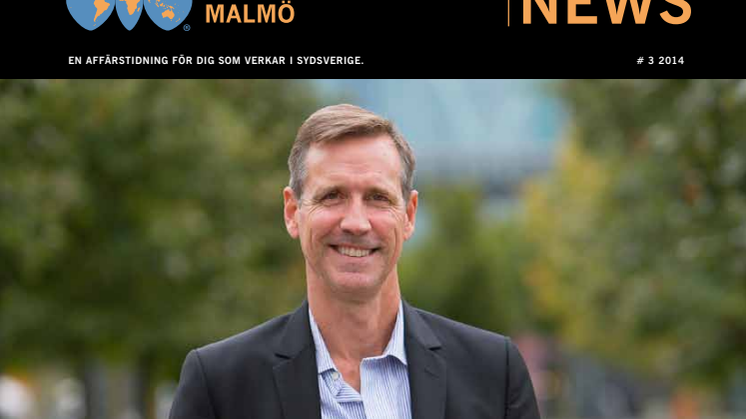News -
From World Trade Center in Malmö to UN in New York
The HIV virus has puzzled researchers all over the world for decades. After lying latent since the 1930s, the virus broke out 50 years later creating one of history’s worst pandemics. In World Trade Center Cavidi is working with the challenging task of limiting the spread of the virus across the world.
As Sweden’s and actually one of the world’s leading suppliers of HIV viral load tests, WTC based Cavidi has managed to get one of the places in Almi’s list of Sweden’s most promising technology companies in company incubators – Tech 20.
Cavidi’s head office is in Uppsala where all R&D is carried out says CEO John Reisky de Dubnic, who has had his base in World Trade Center Malmö since 2010. But from a business perspective it is better that I’m in Malmö. Of course I have my family here too. My main work tasks are carried out in countries far from Sweden, which makes me dependent on good logistics. In 30 minutes I can be at Copenhagen airport and take a flight to Africa, Asia or the USA, where we have most of our strategic partners.
In general terms Cavidi is working on making diagnostics more accessible. Since Cavidi was founded the company has tried to get closer to the HIV-infected population in the parts of the world that are most affected – that is to say a large part of the developing world. This is being done by taking the lab process out into the field, close to the millions of people who live with HIV. In these areas there is usually a lack of laboratories, clinically clean environments and a reliable cold-chain – these are all important factors for giving a correct diagnosis on samples that are extremely sensitive to contamination.
John, who is strongly committed to the HIV-issue, says that they have traced the virus back to the 1930s. The virus existed in infected individuals without making much impact for over 50 years. But in the beginning of the 1980s something happened that caused the virus to start mutating quickly and to aggressively attack the immune system. Why this happened is a mystery even today.
Cavidi’s work is in many ways groundbreaking. Compared to Western countries where HIV patients are routinely tested five times a year to check viral load levels, this test is almost never carried out in the worst affected areas. This is where Cavidi provides a diagnostic instrument that works in resource-limited settings. Building large, centralized labs in developing countries is not possible due to lack of infrastructure and for economic reasons. Even if conditions are improving says John, it is slow progress. In the meantime it is necessary to provide diagnostics for infected people anyway. This is to ensure that the amount of virus is limited which in turn makes them less infectious.
We hope for a vaccine, but in reality this is probably decades away – if that ever happens. But with today’s medicines and with regular diagnostics and follow-up people living with HIV can lead normal lives. We will ensure that more of the 35 million people living with HIV get access to good diagnostics says John.
CEO John Reisky de Dubnic explains the advantages of decentralized testing:
”With today’s medicines and with regular diagnostics and follow-up people living with HIV can lead normal lives. We will ensure that more of the 35 million people living with HIV get access to good diagnostics.”
John’s, Cavidi’s and Sweden’s work in HIV research has not passed unnoticed.
– This spring I had the great honor of representing Sweden and Cavidi at Cavendish Global Health Forum at the UN in New York, which it turned out, was important for the financing of our continued development. Cavidi’s and Sweden’s commitment to countering the HIV epidemic attracted considerable attention which led to us establishing many new and important contacts during the conference.
John has the world as his field of work and he carries a lot of responsibility, but he says he enjoys the toughest challenges. Maybe it is his humble personality and that he seems to have both feet on the ground that helps him to cope with his hectic work life. Or maybe it is just an uncomplicated view of life in general?
If I need to think or get out of the office for a while I take my skateboard and skate in the local park says John and points at the skateboard leaning against his office wall.
This article was translated from Swedish. The original Swedish article appeared October 16, 2014 in WTC News and can be seen in the PDF file below.
Related links
Topics
- Medical research
Categories
- cavidi
- hiv
- innovation
- resource-limited settings
- sweden
- viral load
- un

